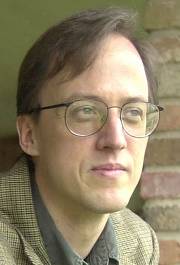FIRST-PERSON: Vindication
for I.D. at Baylor?
By William A. Dembski
May 6, 2010

|
|
William A. Dembski |
Ken Starr, who becomes Baylor's new president June 1, therefore faces a crucial test: Will he continue the full Baylor 2012 Vision, advancing not just Baylor's academic distinction but also its Christian faithfulness, or will he give up on this second pillar of the vision? Starr's commitment to academic excellence is not in doubt. During his tenure as dean of Pepperdine Law School, he significantly raised its academic standing. The question is what he will do regarding Baylor's Christian identity.
Starr, no stranger to controversy, seems poised to do the right thing. But good intentions are one thing, decisions and actions are another. Baylor will be sure to test Starr's mettle. Indeed, his first test is likely to come from an unexpected source, an online college resource known as College Crunch (http://www.collegecrunch.org). Organizations like this draw traffic to their website (and thus earn their keep) by posting items of interest to prospective college students. One such item, first appearing on the site in March, lists "The 20 Most Brilliant Christian Professors." On this list is Baylor professor Robert J. Marks II. Here is College Crunch's description of him (http://www.collegecrunch.org/professors/the-20-most-brilliant-christian-professors):
"Distinguished Professor of Electrical and Computer Engineering at Baylor University. A founder of the field of computational intelligence (comprising fuzzy sets, neural networks, and evolutionary computing), Marks has published hundreds of articles on a very wide range of problems (everything from optimal detection of non-Gaussian noise to proper placement of radioactive inserts to treat prostate cancer). His work has enormous practical implications that are felt every day -- all major North American utilities deliver energy using his work on neural networks. A Christian intent on understanding teleology in nature, Marks founded the Evolutionary Informatics Lab, which publishes peer-reviewed scientific papers supporting the controversial theory of intelligent design."
In appearing on this list, Marks finds himself in the company of such luminaries as Alvin Plantinga, N.T. Wright, Marilynne Robinson, and the SBC's own R. Albert Mohler Jr. Everyone on the list is truly outstanding. The list seems well-balanced and well-thought-out -- it's clear that the people at College Crunch gave it careful attention. Granted, such lists are not to be taken overly seriously. And if that's where things stood, Marks' appearance on the list would go no further.
But it has gone further. The local paper in Waco, where Baylor is located, reported on Marks's newfound super-genius status and drew attention specifically to Marks' Evolutionary Informatics Lab. As Tim Woods reported in the Waco Tribune (April 15, 2010), "In August 2007, though, Marks' research led to legal wrangling with Baylor, which removed his Evolutionary Informatics Lab's Web site from its server without notifying him." (Source: http://www.wacotrib.com/news/Baylor-faculty-member-named-one-of-20-Most-Brilliant-Christian-Professors.html.)
Marks' research lab was expelled from Baylor because Baylor officials saw it as supporting Intelligent Design, a scientific theory that purports to dismantle Darwinian evolution (Baylor biologists enthusiastically teach and promote Darwinian evolution -- see their "Statement on Evolution" on the Baylor Biology Department's website: http://www.baylor.edu/biology). The expulsion of Marks' lab from Baylor was reported nationally from World Magazine to the Chronicle of Higher Education. It was also a centerpiece of Ben Stein's film "Expelled," documenting the persecution that proponents of Intelligent Design endure from the academy.
It is naively optimistic to think that Marks' appearance on the College Crunch list vindicates his research on Intelligent Design. Such optimism would be better justified if incoming Baylor president Ken Starr were to reinstate the Evolutionary Informatics Lab's website on the Baylor server and to recognize Intelligent Design as a legitimate area of research for Baylor faculty. That would constitute a true vindication of Marks' work on Intelligent Design. It would also constitute a true validation of Starr's commitment to the full Baylor 2012 Vision.
Perhaps the College Crunch list is a foretaste of good things to come.
--30--
William A. Dembski teaches at Southwestern Baptist Theological Seminary in Fort Worth, Texas, and was formerly on the faculty of Baylor University. His most recent book, co-authored with Jonathan Witt, is "Intelligent Design Uncensored" (IVP).
| © Copyright 2010 Baptist
Press Original copy of this story can be found at http://www.bpnews.net/bpnews.asp?ID=32885 |